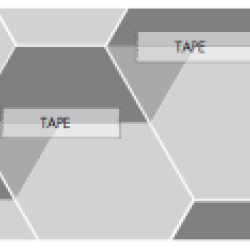Source Institutions
Source Institutions
Add to list Go to activity
Activity link broken? See if it's at the internet archive

In this activity, learners repeat patterns in two and three dimensions to create tessellations. This activity is divided into four parts, in which learners practice tessellating with one shape, two shapes, three shapes, and three-dimensional space. This activity combines the creativity of an art project with the challenge of solving a puzzle.
- 5 to 10 minutes
- 1 to 2 hours
- $1 - $5 per group of students
- Ages 8 - 11
- Activity
- English, Spanish
Quick Guide
Materials List (per group of students)
- Pattern blocks (multiple sets)
- Index card 3 in x 5 in
- Triangle Grid Paper (p.6)
- Markers
- Plain paper
- Pencils
- Tape
- Cubes (sugar cubes, wooden block, or any other cubes that are easy to obtain)
- Rectangular prisms (shoe boxes, toothpaste boxes, tissue boxes—as long as they are all the same size and shape)
- Cylinders (soda cans, paper towel tubes, soup cans, or any cylinders that are all the same size and shape)
- Spheres (marbles, tennis balls, or any spheres that are all the same size)
- Unsharpened pencils (If you rubber band a bunch of pencils together and look at them from the end, you will see a tessellating honeycomb pattern.)
- Any other interesting three-dimensional objects
Subjects
-
Mathematics
-
Algebra
- Patterns
-
Geometry
- Plane Geometry
- Solid Geometry
- Representation
-
Algebra
-
The Nature of Technology
-
The Design Process
- Problem Solving
-
The Design Process
-
The Nature of Science
-
The Scientific Process
- Conducting Investigations
-
The Scientific Process
Informal Categories
- Arts and Crafts
Audience
To use this activity, learners need to:
- see
- touch
Learning styles supported:
- Links STEM to other topics of interest such as arts and humanities
- Involves hands-on or lab activities
Other
Foreign language versions of this resource:
Includes alignment to state and/or national standards:
This resource is part of:
Access Rights:
- Free access
By:
Rights:
- All rights reserved, Exploratorium, 2010
Funding Sources:
- National Science Foundation
- Gordon and Betty Moore Foundation
